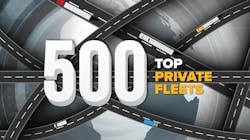FleetOwner 500: Top Private Fleets of 2022
If there ever was a time to show how important it is for companies to control their movement of goods across North America, it is now. Since the COVID-19 pandemic exacerbated the supply chain and labor shortages, many companies have focused on bolstering their transportation systems to help control costs and strengthen their freight networks.
“Transportation probably has never had a higher visibility and importance within companies,” Gary Petty, president of the National Private Truck Council, told FleetOwner. “The shipper community has a collective sense that control has been slipping away. The old notion that you can buy the capacity as we need it—and turn the tap on or off—is a thing of the past.”
See also: PG&E, Meijer, and Hillyard win FleetOwner Private Fleet of the Year honors
The need for companies to control their shipping was magnified as ecommerce sales accelerated in 2020 and 2021 as more consumers stayed home and their delivery expectations grew. That's a theme reflected in the 2022 FleetOwner 500: Top Private Fleets. On the annual ranking, ecommerce giant Amazon makes its first appearance at No. 7 with nearly 14,000 power units among its fleet.
Private carriers own a fleet of vehicles to support businesses that range from wholesale and retail, public utility, manufacturing, construction, waste management, agriculture, and more.
Retailers, such as Home Depot (No. 72), Southern States Cooperative (No. 183), and O’Reilly Auto Parts (No. 276), saw their FleetOwner 500 rankings jump more than 100 spots in the past year. Other fleets seeing big jumps in the list include agriculture and energy cooperatives Co-Alliance (No. 204) and Agriland (No. 345), and construction firm Riggs Distler (No. 214).
“You see a lot of companies not only expanding their fleets by adding drivers and equipment, but they’re also actually buying outside carrier companies that have basically been third-party providers and embracing them as new parts of their private fleets,” Petty explained.
Other companies are more interested in building private fleets “from scratch,” he said. “You can’t go to market and buy a private fleet off the shelf. But you can invest in the talent and leadership to build a private fleet, and several companies are doing that.”
See also: What do drivers really want? Ask them.
The immense growth of some of these retailers and service companies to add their capacity is a more significant reason why some private fleets saw their rankings fall over the past year. It’s not that those companies shrunk as much as others grew. Some business types that saw their fleets fall by at least 100 ranking spots in the past year were business/home service companies, construction companies, and manufacturers.
Petty said this transformation is not over. “The private fleet is still peaking. It’s never had more attention, visibility, and importance in the shipper community than today,” he said. “That is driven by so much uncertainty going on—if the capacity is not under control and managed internally, there’s risk that it won’t be there.”
More than 75% of private fleets surveyed in NPTC’s 2021 Benchmarking Survey Report of its member fleets expect their fleets to grow by adding more equipment and freight over the next five years. And most of these fleets have built a culture of retention, according to the same study. While much of the trucking industry faces growing driver shortages, private fleets tend to have less turnover than for-hire carriers. According to NPTC, the fleets with the best retention rates offer better pay and have higher safety records. For example, in 2021, private fleets saw driver turnover rates fall to 15.8%, from 18.5% in 2020, according to NPTC.
The 2022 FleetOwner 500: Top Private Fleets rankings on the following pages are based on the number of power units (trucks and tractors) each fleet operates and the industries their companies serve. Fleet rankings are also broken up by industry. The list is based on a FleetSeek database that collects information from FMCSA’s Safety Measurement System.
Click "Download" below to view the list.
